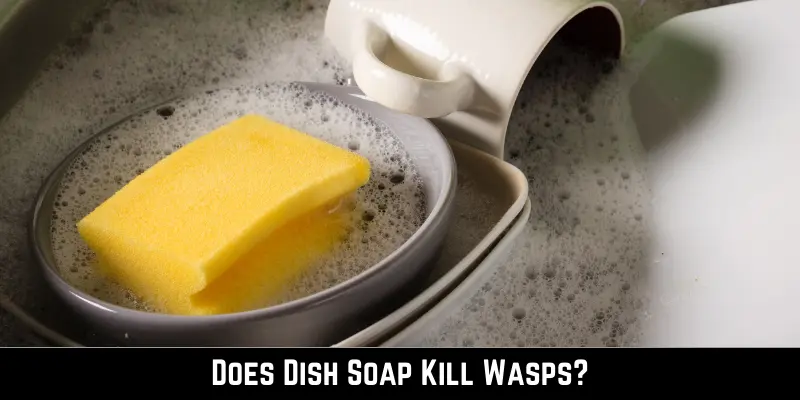Wasps are one of the nuisance creatures, especially in summer. You may always wonder to get rid of them permanently, but how? This question hits everyone, but have you ever tried dish soap to deter wasps? No, you may think about, does dish soap kill wasps?
Yes, dish soap is a very effective home remedy to kill wasps. To use dish soap to kill wasps, add 2 to 3 tablespoons of any dish soap to a spray bottle, and mix it well. Now, you can spray this solution in suspected areas of wasps’ presence.
Are you struggling with wasp infestation and want to use dish soap, but don’t know how to employ it effectively? Read the below details to resolve your queries.
Can You Kill Wasps with Soapy Water?
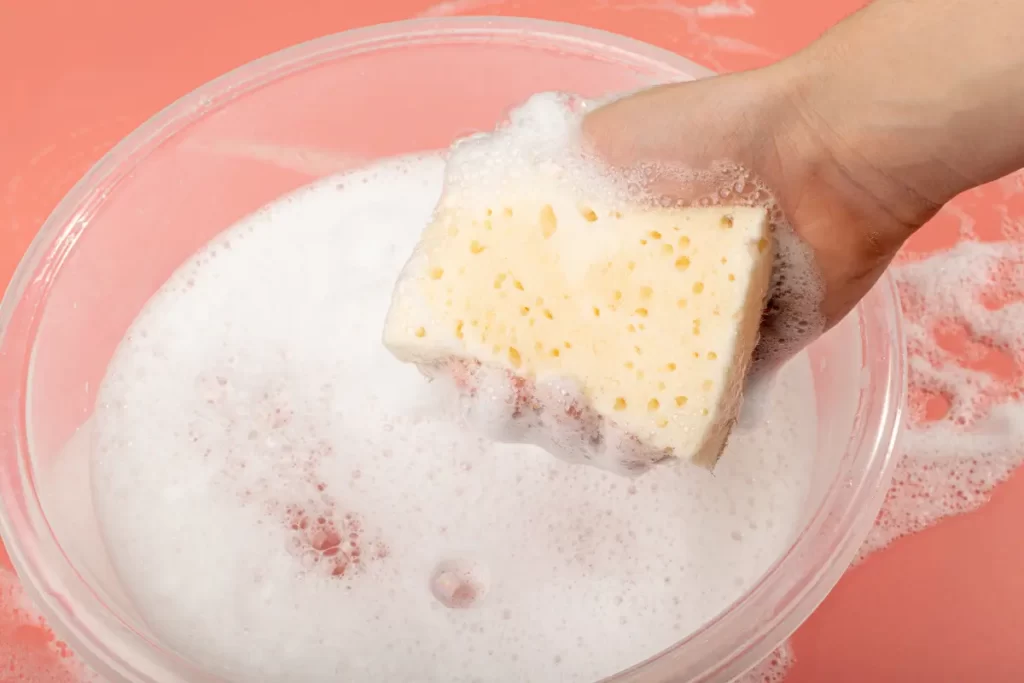
Yes, soapy water is a very effective remedy for killing wasps. Wasps have tiny tube-like structures for breathing called spiracles. When you sprinkle soapy water on a wasp, it clogs these tubes and makes them unable to breathe, as a result, they die eventually.
Add ¼ cup of dish soap to 2 cups of water, then stir it well to prepare the soap and water mixture. Now, you can spray this solution in suspected areas of wasp’s infestation. However, before sprinkling the mixture, make sure to wear protective clothes like long sleeves, and gloves.
As wasps are less active at dawn and dusk, you should approach their nest at this time. Now, after spraying the solution, stand back to a safe distance and wait for the soap to take effect. If any wasp remains active, spray the solution again for complete eradication.
How Does Dish Soap Kill Wasps?
Dish soap is highly good in killing wasps because it disrupts their respiratory system. Here is how it works to kill wasps:
Penetrate Exoskeleton
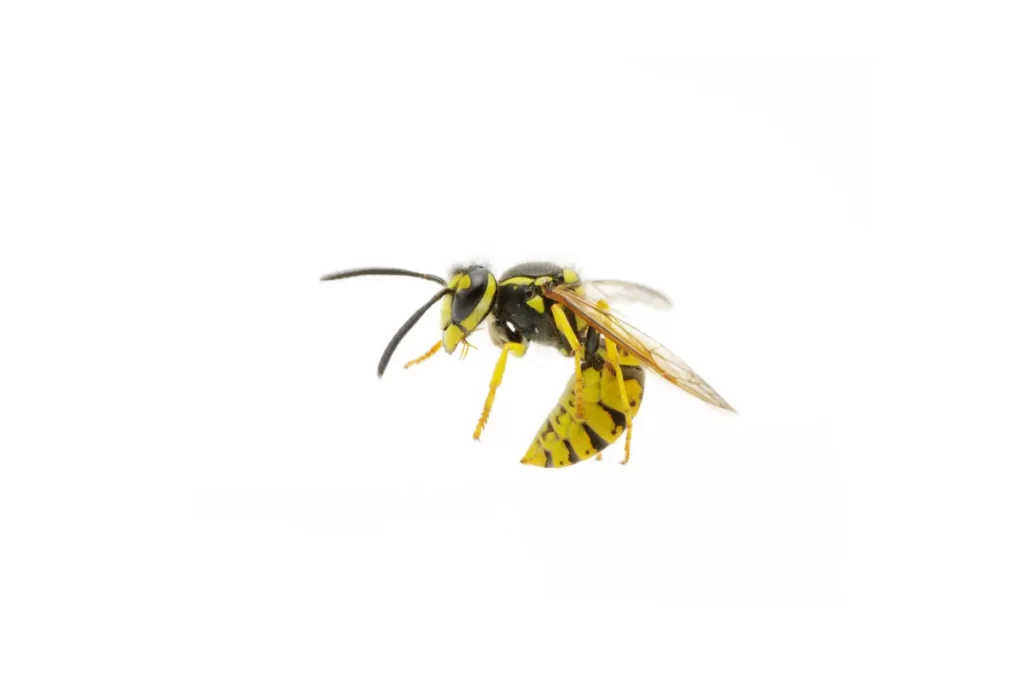
Wasps have a protective exoskeleton that retains moisture and provides protection from any external stimuli. A tiny layer of wax on this exoskeleton repels water. Dish soap consists of surfactants like isothiazolinones that reduce the surface tension of liquids and break fats and oil. According to the journal MDPI, isothiazolinones work as an insecticide.
When you spray soapy water on a wasp, the soap molecules disrupt the waxy layer of its exoskeleton and decrease its ability to repel water. As a result, the wasps lose buoyancy and become coated in soap, resulting in suffocation and death.
Suffocation
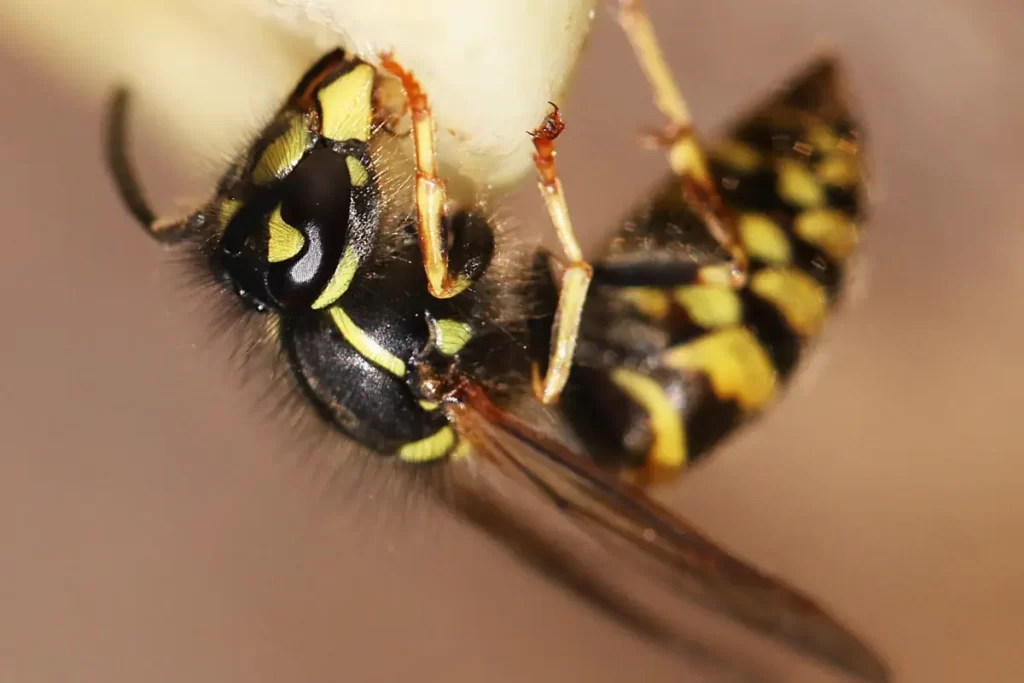
As a mixture of soap and water has less surface tension, wasp absorbs it easily. After the absorption, this solution interferes with the wasp’s ability to regulate water and gas exchange.
Essentially, the soap interferes with wasps’ respiration and metabolic functions. As wasps rely on tiny tubes for respiration, this soapy solution blocks these pathways and ultimately results in suffocation.
Disrupt Wasp Physiology
Soap molecules can also damage the cell membranes of wasps and interfere with their physiological functions. It weakens the wasps even more and contributes to their eventual extinction.
Immobile Wasps
Soapy water does not kill wasps instantaneously, rather it immobilizes them and impairs their ability to fly or sting effectively. Because wasps cannot attack you when you are immobilized, you are in an ideal position to deal with them securely.
How to Use Dish Soap to Kill Wasps?
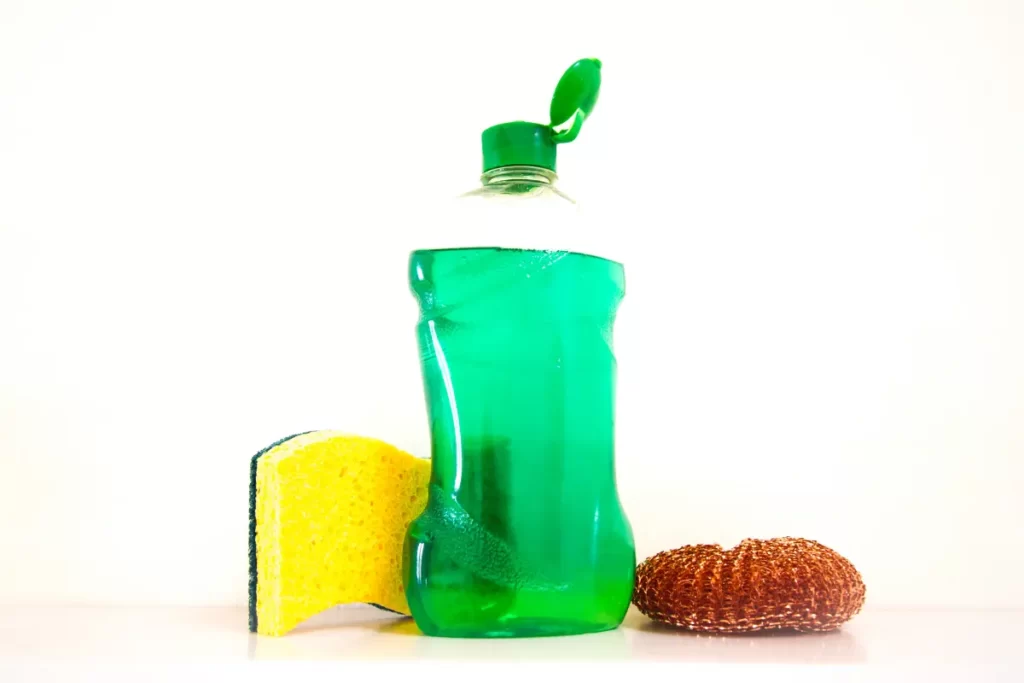
Using soap to kill wasps is not a big deal, you can easily do so by following the below steps.
Make a Solution
The first thing you need to do to kill wasps is the preparation of soap and water mixture. For this, add 2 to 3 tablespoons of any dish soap in a gallon of water, then stir it well to get a proper mixture. Remember to avoid shaking the bottle vigorously to prevent excessive foaming.
Choose a Suitable Time
The application time greatly influences the process’s safety and effectiveness. So, you should be careful about this. Choose dawn and dusk to sprinkle soapy water on wasps because they are usually inactive at this time.
Moreover, as wasps’ bodies are generally cold in the morning, it would be the best time to administer soapy water. Similarly, since wasps are preparing for the night, they are less active in the late evening. So, you can also kill them during this time.
Wear Safety Gear

When applying soapy water to a wasp nest, it’s vital to protect yourself. For this, you can wear one of the following protective clothing options:
- Long Sleeves: You should always wear a long-sleeved shirt or jacket to protect your arms and reduce the areas of your body susceptible to stings.
- Long pants or slacks: Moreover, you should either wear long pants or tuck them into socks or boots to keep wasps out of your garments.
- Gloves: Thick and fitted gloves protect your hands from a wasp attack. Therefore, you should always wear heavy-duty gloves while preserving dexterity when utilizing tools or handling the spray bottle.
- Wear a face and eye mask: A face and eye mask protects your face and eyes from the wasp attack. Therefore, you should always wear either eye goggles or protective glasses to safeguard your eyes. For the protection of your face, you should always wear a face mask while approaching the wasps.
Find the Nest

Before spraying the soapy water on a wasp nest, it’s essential to know the exact location of the nest. Therefore, you should spend some time examining the wasps’ movements, noting where they fly from and return to. It’ll give you a clue about the exact location of their nest.
Moreover, follow their flight trajectories to see if you can figure out where they’re nesting. It will help you find their nest because wasps often fly directly from their nest to foraging locations. Also, look for wasp activity on the outside of your house, garage, outbuildings, or surrounding trees.
Additionally, you should also look for any openings in your walls for the wasp’s presence. Apart from that, pay attention to wasps buzzing around your surroundings.
Sprinkle the Solution
After finding the nest, approach the nest with caution, moving slowly and deliberately while keeping a safe distance to prevent upsetting the wasps. Now, you can spray the solution on the wasp nest. However, remember to pay special attention to the entrance, active regions, and the wasps themselves.
Analyze the Nest and Repeat the Procedure
After sprinkling the solution, move away from the nest slowly, and wait for a while so that soapy water starts working.
You may notice the falling and sluggishness of some wasps. Wasps will take some time to become crippled and unable to fly after being sprayed with soapy water, so you should show some patience.
If you find any more wasps flying around after the spray, repeat the same procedure to kill all the wasps permanently.
Discard the Nest
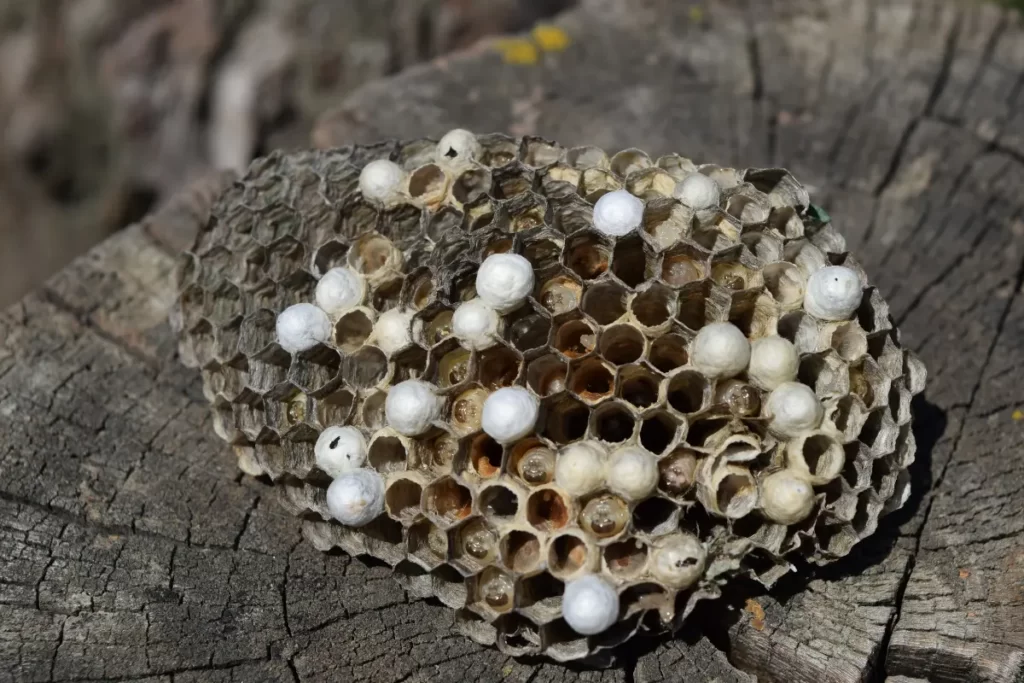
The next and final step is to remove the wasp nest carefully. Detach the wasp nest carefully, so you shouldn’t disturb any living wasp left in the nest. Put the nest in a plastic bag and seal it tightly so that, any living wasp can’t escape.
Now, double-pack the nest by placing the bag in another bag, then seal it with a tight knot. After that, discard the bag in the outside rubbish bin. Now, you can remove gloves and wash your hands properly to eradicate germs.
Ensure Preventive Measures
Although removing the wasp can get rid of wasps, you should adopt preventive or safety measures to keep the wasps away from your home or property permanently. For this, you should regularly clean your home, seal and discard the garbage cans, and close all the entry points.
Furthermore, you should inspect the potential areas of your home regularly, like the garage, eaves, and drainage system. Trim the trees, bushes, and shrubs regularly, and plant wasps-repelling plants like eucalyptus and mint in your yards to deter them.
How Fast Does Dish Soap Kill Wasps?
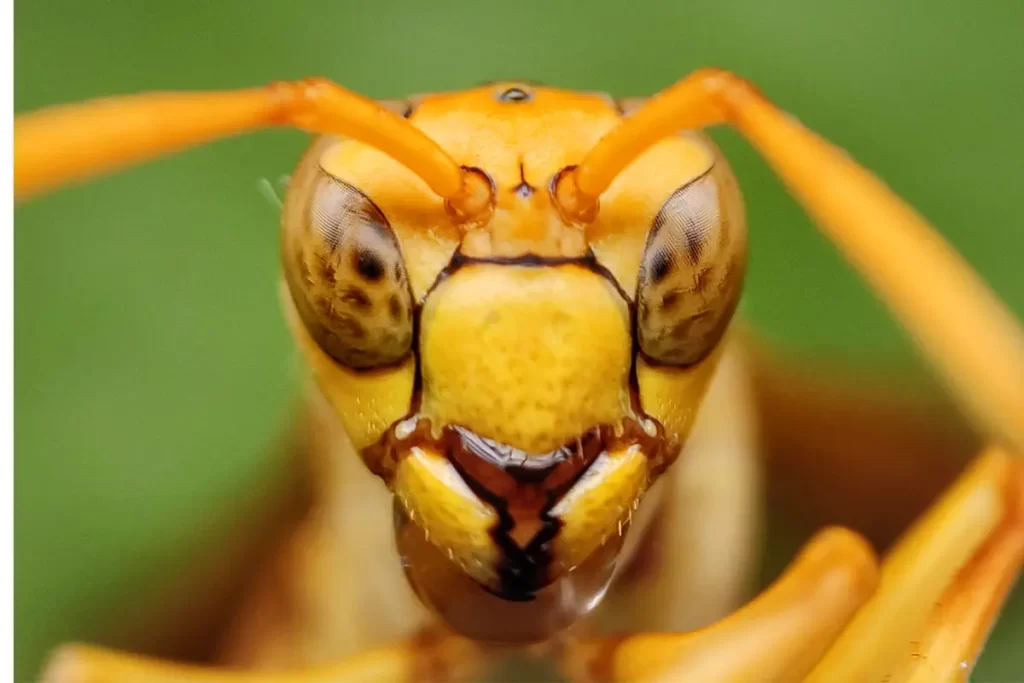
Although dish soap is an effective remedy to kill wasps, the time it takes depends on various factors including, the concentration of soap, the size of a wasp, and its activity level. Generally, it takes a few minutes to hours for soapy water to kill wasps. Individual wasps or tiny nests may suffocate quite quickly.
Some wasps may succumb to death in a matter of seconds, while other wasps may take several hours to die. However, it’s important to remember, that the time it requires to completely eradicate the nest completely can vary.
For example, a massive nest with a large number of wasps may require several applications of soapy water for complete eradication. Therefore, you should always remember these points while employing dish soap to kill wasps.
How to Make DIY Wasp Spray with Dish Soap to Kill Wasps?
Do you want to deter wasps with dish soap? You must have the below ingredients to make a DIY wasp spray.
- A spray bottle with a hose-end = 1
- Any liquid dish soap = 2 to 3 tbsp
- Hot or cold water = 2 cups
- Outdoor hose
Now, follow the below steps to make a DIY wasp spray with dish soap:
- Firstly, you need to add 2 to 3 tbsp of liquid dish soap in a spray bottle.
- Now, you can add 2 cups of water to it.
- Stir the solution well to get a mixture.
- After that, you can connect the garden hose with a spray bottle. Now wait till the evening or morning to sprinkle this solution on a wasp nest.
Can Dishwashing Liquid Kill Wasps?

Yes, dishwashing liquid is an effective way to kill wasps. It works the same way as dish soap to kill wasps.
If you want to kill wasps with a dishwashing liquid instead of dish soap, take 2 to 3 tbsp of dish soap in a jar, then add some water to it and mix it well. However, you should avoid mixing vigorously to prevent foaming in a jar.
After preparing the mixture, wear gloves, then sprinkle this mixture on a wasp nest from standing a few feet apart from the exact location.
When you find no wasp around or you don’t hear their buzzing, then it’s most likely a sign of their complete eradication. After ensuring this point, you can discard the wasp nest in an outside trash bin.
What Will Happen When You Spray a Wasp Nest with Soapy Water?
You may know now that soapy water kills wasps instantly, but how it reacts to wasps is still a question. Here is how it causes the death of a wasp:
- As soapy water lowers the surface tension of a liquid, it’s easier to penetrate the exoskeleton of a wasp. Consequently, it blocks tiny tubes (trachea) of a wasp and causes them to suffocate to death.
- The soapy water can also make the wings of the wasp wet and heavy. In this situation, if a wasp wants to fly, it would be difficult to do so, which ultimately causes it to fall to the ground.
- Moreover, soapy water can also damage the structural integrity of a wasp nest and cause it to collapse, eventually making it difficult for a wasp to reside.
Thus, all these things work in combination to kill the wasps.
Can Wasps Return to a Sprayed Nest?
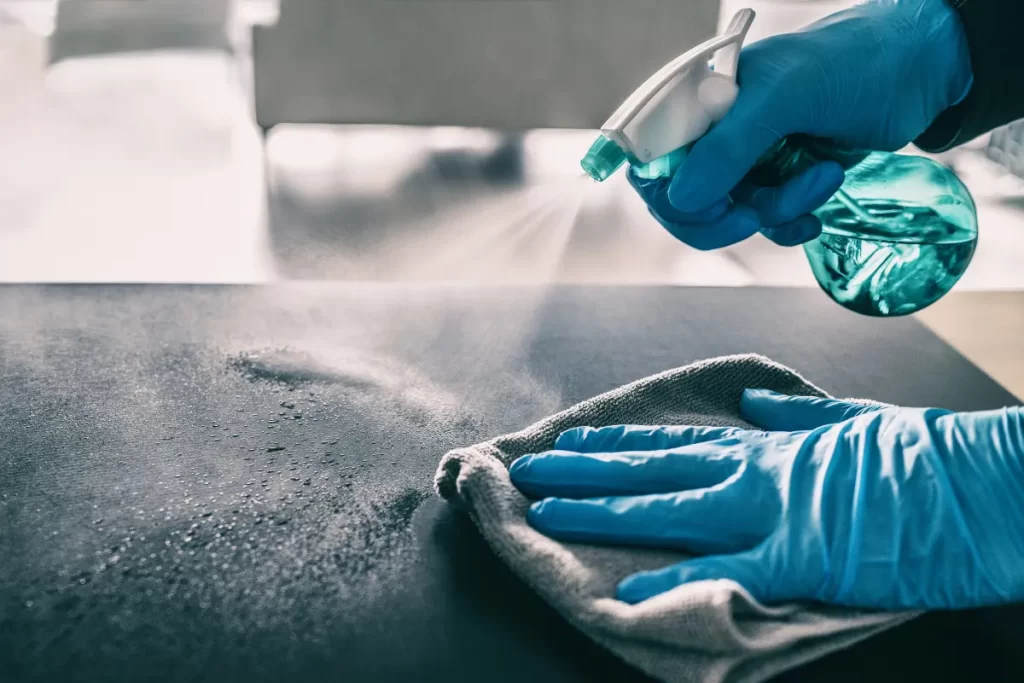
No, wasps don’t return to a sprayed nest mostly. However, if the wasp nest isn’t destroyed completely or if there are a few living wasps left in the nest, then there must be a chance of wasps returning.
Moreover, wasps don’t have a strong memory span. If you spray soapy water on their nest, they will forget it within 15 minutes. In this way, they can’t remember about the spray and will come back to the nest happily. Therefore, you should spray the solution every day for 2 weeks, so that they’ll remember that there is no food left behind.
Additionally, it’s best to spray the wasp nest at night, because all wasps are present in their spots and it would be easier to kill them collectively.
Advantages and Disadvantages of Dish Soap to Kill Wasps
Although dish soap is an excellent method to kill wasps, it also has some disadvantages. Below are some pros and cons of dish soap that you must know before application:
Advantages
Following are some benefits of dish soap to kill wasps:
- Soapy water is a natural way to kill wasps, it poses little threat to environmentally friendly pests.
- It has little health risks, so you can spray it without any worry.
- As soap is readily available in every household, soapy water is an affordable method to kill wasps.
- You don’t need special equipment or training to apply soapy water to a wasp nest.
Disadvantages
Following are some disadvantages of dish soap to kill wasps:
- Soapy water isn’t effective in the complete eradication of a large wasp nest or extensive infestation. For this, you must need professional help.
- Moreover, soapy water requires direct application to a wasp nest and may result in further damage.
- Dish soap contains surfactants. According to the Journal of Dermatitis, surfactants can cause allergic reactions. Therefore, you should ensure safety while employing dish soap.
- Additionally, this method is suitable for active wasp nests and doesn’t prevent future infestation.
Precautions to Take When Using Dishwasher to Kill Wasps
Although soapy water to kill wasps isn’t a risky method, you should follow the below precautionary measures to ensure safety:
- Always wear protective clothing, including long sleeves, gloves, and long pants, so that wasps can’t attack you.
- Tell your family to stay away from the war zone.
- Spray the wasp’s nest at dawn or dusk because wasps are usually less active at this time.
- Moreover, make sure to close all the windows and doors of your house so that wasps can’t enter your home.
- Always maintain a safe distance from a nest while spraying.
- Lastly, after sprinkling the nest, discard it properly and clean the area.
Bottom Line
Wasps are one of the most irritating pests and eradication is always questionable. However, you can use dish soap to kill them immediately. Dish soap blocks their respiratory tracts and makes them unable to breathe, as a result, they die because of suffocation.
The best way to apply dish soap to a wasp nest is its solution with water. For this, you can add a small amount of dish soap in a water spray bottle, and then stir it well. After that, you can splash it on a wasp nest. However, if you have a large wasp infestation, don’t try to eradicate them with soapy water, instead ask for help from a professional company to prevent more harm.
FAQs
References
Hanson JL, Warshaw EM. Contact allergy to surfactants in a hypoallergenic liquid cleanser. Dermatitis 2015;26(6):284–286.
